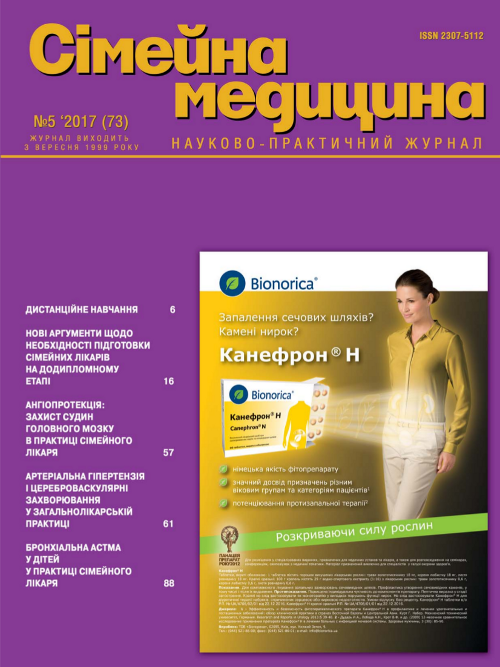Aspazmin in the treatment irritable bowel syndrome
##plugins.themes.bootstrap3.article.main##
Abstract
The objective: analysis of the effectiveness of spasmolytic Aspazmin (mebeverin hydrochloride) at the «Kyiv Vitamin Plant» in the treat ment of patients with irritable bowel syndrome (IBS) with constipation and diarrhea.
Materials and methods. The study involved 125 patients with SLE with diarrhea and constipation, which were divided into four groups: Group 1 – 41 patients with PDS with diarrhea who received the Aspazmin treatment; 2nd group – 21 patients with spasm with spasm that did not receive Aspasmin; 3rd group – 42 patients with constipation, who received Aspazmin; 4th group – 21 patients with constipation, who did not receive Aspazmin. Patients who did not receive Asapzmine prescribed a standard therapy for the treatment of diarrhea or constipation. Patients in the studied groups were comparable by gender and age. The average age of patients was 37 years.
Results. As a result of the study, it was found that abdominal pain was statistically significantly reduced in patients treated with Aspazmin. In addition, patients in the study group, which was designated Aspazmin, rather showed a positive dynamics and constipation, and diarrhea. Patients treated with Aspazmin experienced a significant improvement in Likerta, GSRS, and HADS scales.
Conclusion. Aspasmin is an effective drug for treating patients with irritable bowel syndrome (IBS). The use of asphasmina improves the quality of life of patients with SCI, reducing the percentage of anxiety and depression.
##plugins.themes.bootstrap3.article.details##

This work is licensed under a Creative Commons Attribution 4.0 International License.
Authors retain the copyright and grant the journal the first publication of original scientific articles under the Creative Commons Attribution 4.0 International License, which allows others to distribute work with acknowledgment of authorship and first publication in this journal.
References
Андреев Д.Н., Самсонов А.А., Черемушкин С.В. Синдром раздраженного кишечника: критерии диагностики и подходы к терапии. Фарматека. 2014; 14: 6–11.
Маев И.В., Кучерявый Ю.А., Черемушкин С.В. Эволюция представлений о синдроме раздраженного кишечника. Методическое пособие для врачей. – М., 2013.
Маев И.В., Черемушкин С.В., Кучерявый Ю.А., Черемушкина Н.В. Синдром раздраженного кишечника Римские критерии IV. Consilium Medicum. 2016; 08: 79–85.
Свинцицкий А.С., Соловьева Г.А., Кваченюк Е.Л., Нагиева С.А. Синдром раздраженного кишечника: от патогенеза к лечению // УМЖ. – 2013. – No 5. – С. 97.
Яковенко Э.П., Агафонова Н.А., Яковенко А.В., Назарбекова Р.С. Эффективность мебеверина гидрохлорида в коррекции моторных нарушений кишечника // РМЖ. – 2005. – No 2. – С. 101.
Barbara G., De Giorgio R., Stanghellini V., et al. New pathophysio logical mechanisms in irritable bowel syndrome. Aliment Pharmacol. Ther. 2004;20 (Suppl 2): 1–9.
Bueno L., Fioramonti J., Garcia Villar R. Pathobiology of visceral pain: molecular mechanisms and therapeutic implications. III. Visceral afferent pathways: a source of new therapeutic targets for abdominal pain. Am. J. Physiol. Gastrointest Liver Physiol. 2000; 278: G670–76.
Caldarella M.P., Milano A., Laterza F. et al. (2005) Visceral sensitivity and symptoms in patients with constipation– or diarrhea predominant irritable bowel syndrome (IBS): effect of a lowfat intraduodenal infusion. Am. J. Gastroenterol., 100(2): 383–389.
Chang J.Y., Locke G.R., McNally M.A., et al. Impact of function al gastrointestinal disorders on survival in the community. Am J Gastroenterol. 2010;105(4):822–832.
Chaudhary NA, Trulove SC The irritable colon syndrome. A study of the clinical features, predisposing causes, and prognosis in 130 cases. Q J Med. 1962 Jul; 31():307–22.
Connel A.M. Physiological and clinical assessment of the effect of the musculotropic agent mebeverin on the human colon.// Br. Med. J. – 1965. – Vol. 2. – P. 848–851.
Delvaux M. Role of visceral sensitivity in the pathophysiology of irritable bowel syndrome. Gut. 2002;51: i67–71.
Ford А.C., Moayyedi P., Lacy B.E. et al, American College of Gastroenterology monograph on the management of irritable bowel syndrome and chronic idiopathic constipation. Am J Gastroenterol. 2014; 109: S2–S26 (quiz S27).
Grudmannand О., Saunjoo L. Yoon Complementary and alternative medicines in irritable bowel syndrome: An integrative view. World J Gastroenterol 2014; 20 (2): 346–62.
Gunnarsson J., Simrеn M. Peripheral factors in the pathophysiology of irritable bowel syndrome. Dig. Liver Dis. 2009;41:788–93.
Hahn BA, Kirchdoerfer LJ, Fullerton S, Mayer E. Patient – perceived severity of irritable bowel syndrome in relation to symptoms, health resource utilization and quality of life. Aliment Pharmacol Ther 1997: 11: 553–559.
Ivashkin V.T., Polouektova E.A., Minushkin A.N. et al. Clinical evaluation of the rome iiquestionnaire for the diagnosis of functional gastrointestinal disorders (fgid), as compared with the diagnostic of the clinician, in patients consulting in gastroenterology. Results of a multicentre russian trial // Gut 2005; 54 (Suppl VII) A3.
Lacy B.E., Mearin F., Chang L., Chey W.D., Lembo A.J., Simren M., Spiller R. Bowel Disorders // Gastroenterology. – 2016; 150: 1393–1407.
Svedlund J, Sjodin I, Dotevall G. GSRS – A clinical rating scale for gastrointestinal symptoms in patients with irritable bowel syndrome and pepticulcer disease. Dig Dis Sci. 1988; 33: 129–134.
Talley N.J. Irritable bowel syndrome. In: Feldman M, Friedman LS, Brandt LJ, eds. Sleisenger & Fordtran’s Gastrointestinal and Liver Disease. 9th ed. Philadelphia, Pa: Saunders Elsevier; 2010. 118 p.
What is Likert Scale? [Электронный ресурс]. – Режим доступа: http://core.ecu.edu/psyc/wuenschk/StatHelp/Likert.htm





